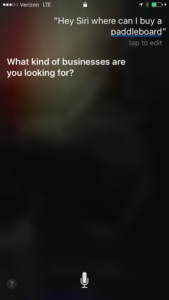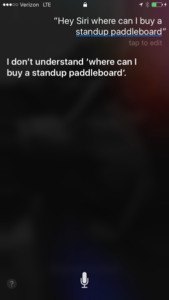Voice search is all the rage. To hear it from a marketing or search technologist, the voice search revolution is on us. Lowering barriers to access and radically changing the way we interact with devices. There is only one problem, take it away Dr. Malcolm
I hate to break it to everyone, but voice search is not good. Like straight up not good in terms of being able to consistently provide answers to search queries in ways that are sensical and replicable. I get it, it’s super fascinating and future tech to be able to interact with a machine via your voice. All us nerds want to live in the world of the Star Trek computer, at least me and my boy Amit Singhal do, but this is the .001 version of that concept and we all need to embrace that. At the end of 2016, we provided everyone at Local SEO Guide Google Home’s to do some voice search research, something that Andrew and I have been playing around with a bit on our own for a couple of years now. These are their stories.
Results Hodgepodge
Voice search regularly provides a non-intuitive user experience or fails to deliver relevant results. Now I can just hear people saying:
What are you talking about Dan? How can talking not be an intuitive user experience?
Pretty simple answer random internet stranger, voice search engines still have a hard time with natural language processing. There, I said it. Here is an example for non-standard words e.g. a Japanese restaurant called “Tanuki”:
- Thought searcher was saying “The New Key” the first several times I requested it.
- Even tried “The New Key Tanuki” and it recognized both as “the new key”
- Eventually found it using a directions query asking “where is the restaurant tanuki?”
- Even though searcher is in Portland it gave them directions to a restaurant in Northern California
- Had to clarify “tanuki portland” for those directions
Even if it gets things right 90% of the time, which I doubt it does but would need to do research at scale, that’s a 10% fail rate. If your web interactions failed 10% of the time, how annoying would it be to use?
Also, it just isn’t that great at returning relevant search results. Just looks at this string of fails that Siri had to some pretty basic natural language questions:
“Where can I buy a paddle board?”

“Where can I buy a standup paddle board?”

And my favorite, asking how to make Chicken Curry provides the Wikipedia page, not a recipe. GG Siri!
It also often returns less valuable results than the web (desktop or mobile) searches, though that is something I will dive into at a later date.
Getting Better Results Means Searching Differently
One of the things we have noticed in our research is that adding more semantically relevant descriptors around commands and voice search queries provides better results. This is great for a power user, but bad for casual users who want to use NATURAL LANGUAGE, not be trained in the search protocols and interpretive quirks of voice search. Here is a pretty common example in regards to this:
Ex: Tried to listen to Chris Thile
-
- Results from “Play Chris Thile”:
- Interpretation: Play Chris Bailey
- Response: Alright, check out this Chris Bailey radio mix on Google Play Music.
- Interpretation: Play Chris Farley
- Response: My apologies… I don’t understand.
- Interpretation: Play Chris Bailey
- ` Results from “Play Chris Thile Bluegrass”
- Interpretation: Play Chris Thile Bluegrass
- Response: Since I couldn’t find the album Edgar Meyer & Chris Thile in your music library, here’s a similar mix on Google Play Music.
- Interpretation: Play Chris Thile Bluegrass
- Results from “Play Chris Thile”:
So here is a question, why did adding the music genre mean that Google should look for it in my library? And why is it doing that since I have Spotify set to my primary music application? The world may never know. Also, this is the type of user experience that would royally piss of someone like my mom (and probably your mom too). If voice search is aimed at the lay user versus the power user, expect them to regularly have a horrible time with your brand during a good percentage of voice search interactions.
Sorry to throw a bucket of water on the technologists and marketing technologists, but voice search just isn’t ready for the primetime as a marketing channel/strategy just quite yet. We are going to dive deeper into this subject in the coming weeks. Up next, voice search results don’t different from web results… Or do they?




10 Response Comments
When I played with voice search, I found the same trouble. Google’s new Tensorflow system and deep learning approach to problem solving have made some incredible advances in language translation and comprehension (look at Google Translate’s massive bump with their new system last November) but we’re still a long ways off from perfect.
My own belief, is that Star Trek level speech understanding and response is going to require artificial general intelligence. It’s too varied, too nuanced, and too complicated to solve in a specialized way, so by the time we’ve solved it, we’ll have for all intents and purposes completely shattered Turing’s AI test. If you can ask Google a question and 100% of the time expect a reasonable response, I think it’s equally likely you could expect it to carry on a conversation with you like a person could. I know Ray Kurzweil thinks we’ll be there by 2029 (I definitely believe it’s coming) but for now, it’s voice seems like a gimmicky toy that’s more frustrating than awe inspiring.
That said, the more important metric isn’t ‘is this perfect’ but ‘are people using it?’ From what I’ve seen, looks like they are. 20% of mobile searches are being done with voice according to Google last year, and I’ve seen estimates that up to 40% of adults are using voice search at least once per day. I’m not tempted to start using it myself based on my experiences so far, but seems like it’s a part of the equation that’s here to stay, regardless of whether or not it feels like an immature technology. Have you seen different? Isn’t it ready for the primetime (as far as we’re concerned) if enough people are already using it?
You will have to stay tuned for further articles on the subject James 🙂
I can tell you, I’m not really concerned with voice search as an optimization opportunity. I’m much more concerned with voice search as an ORM/UX problem.
Isn’t all search an ORM/UX problem from a certain perspective though? Either way, I’ll be looking forward to reading the rest of what you have to say on the topic.
I’m so glad more people are coming out and saying stuff like this. It’s all hype right now and all the search talking heads are going on and on about voice search and I think it’s all hype and its making SEO’s look in the wrong direction. SEER came to a similar conclusion as you guys did (check out their results here http://www.seerinteractive.com/blog/ok-google-focus-voice-search-2017/) I definitely hope more people in the industry start sharing their actual experiences instead of the stats and info the companies making the tech are spewing to them.
Thanks Mike! Always good to hear.
I love that SEER take, didn’t get into it too much in this one but am definitely going to when I talk about “optimization opportunities”
Very helpful article Dan, thanks for sharing.
I have a quick question for you.
I do agree that voice search at this point is not good. But how big of an impact can voice search have on SEO in general once when it reaches an advanced level?
Kind regards,
Filip
Totally agree Dan. I’ve tried on my own using Siri and Bing search results. The results I get are terrible and thus don’t use it outside of looking for a specific business.
Yes voice search is terrible right now. But I have feeling it will get better eventually, but It will take years to get good voice search result. I think for now we don’t have to worry about voice search in SEO prospect.
Very informative Dan and completely agree, the results are not great right now but the opportunity for R&D can be huge.
I’ve yelled at my Echo dot countless times just because it doesn’t understand some of the music I want it to play. It’s also why I hate using Siri. I’ll stick to my searches on keyboard in the mean time.